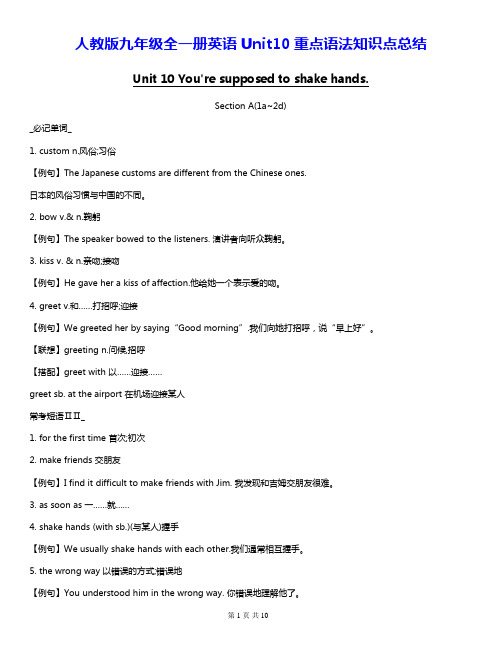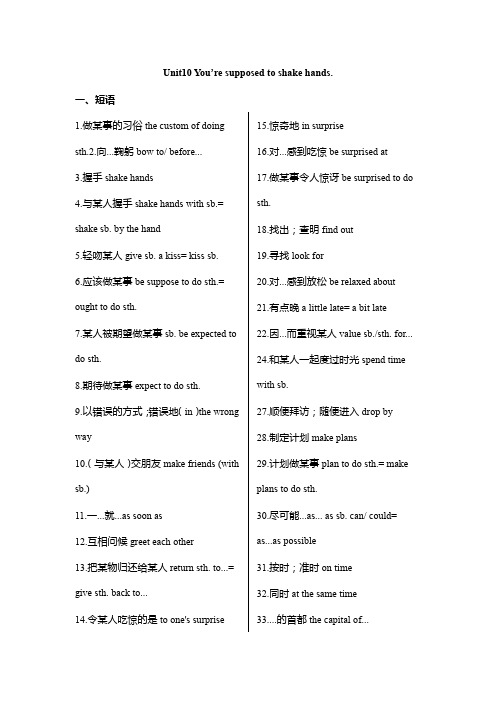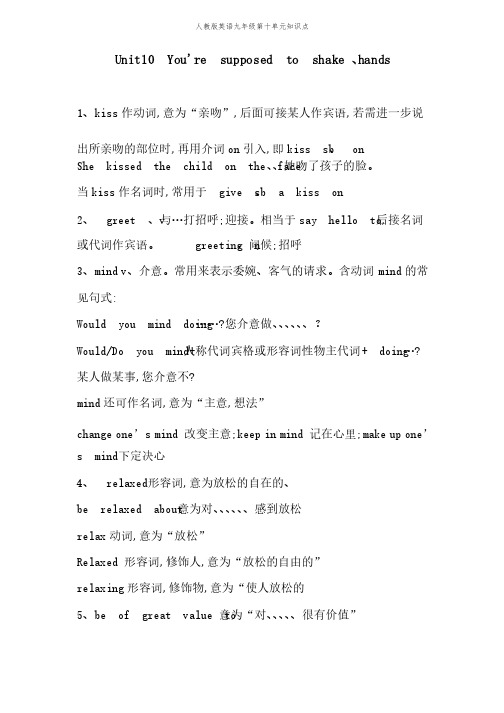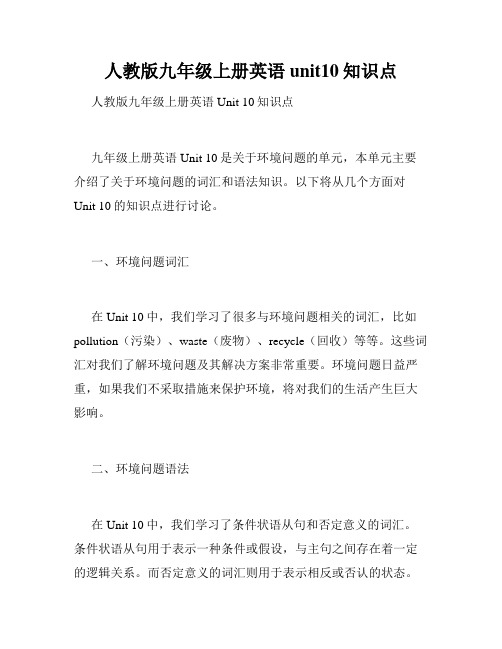英语人教版九年级10单元所有语法
2022年秋人教版九年级英语第十单元语法知识(besupposedtodo)

2022年秋人教版九年级英语第十单元语法知识(besupposedtodo)第十单元语法知识beuppoedtodoth的用法:beuppoedtodoth=houlddoth=bee某pectedtodoth(译为“应该做某事”)人称,时态和句式的变化在be动词上体现(注意:bee某pectedtodoth还可以表示为“被期待做某事”,根据句意翻译)1、肯定句:eg:Iamuppoedtolookaftermyiter.Heiuppoedtoworkhard.Theyareupp oedtoleepatnine.2、否定句:eg:Iamnotuppoedtolookaftermyiter.Hein’tuppoedtoworkhard.The yaren’tuppoedtoleepatnine.3、一般疑问句:eg:AreyouuppoedtolookafteryouriterIheuppoedtoworkhardArethey uppoedtoleepatnine4、特殊疑问句:Ye,Iam.No,Iamnot.Ye,hei.No,hein’t.Ye,theyare.No,theyaren’t.用法:1)beuppoedtodoth:当主语是人时,译为“应该做某事”,可以用来表示劝告、建议、义务、责任等eg:Youaren’tuppoedtoplayfootballintheclaroom.2)当beuppoedtodoth的主语是物时,表示“本应该做某事”,用来表示“某事本应该发生而没有发生”eg:Thetrainwauppoedtoarrivehalfanhourago.(火车本该在半小时前到,但是没到)3)beuppoedto+have+过去分词:主语为人时,译为“本应该做某事而没有做”,含有责备,失望之意eg:Heiuppoedtohavearrivedanhourago.(他本应该一小时前就到了,含有责备之意)1.PeopleinChinaareuppoedtohakehandwhentheymeettheirfriend.(提问)___________________peopleinChina____________________________ whentheymeettheirfriend1.Sheiuppoedtoarriveat7a.m.(一般疑问句)_____________he_________________________arriveat7a.m.Imadeamitakeatthedinnertable.IhouldhaveakedyouwhatI_________ _______________________.5.Youhouldgreetyourclamatebyaying“Hello ”.(同义句)You____________________________________greetyourclamatebyayi ng“Hello”.6.WhatareyouuppoedtodoDoyouknow(合并为宾语从句)Doyouknow___________________________________________________ __todo7.Youwereuppoedtowinthegame.(否定)I_________________________________________________portman___ ____________________.10.EnglihcanbepokenbyalotofpeopleinChinanow.(主动语态)AlotofpeopleinChina_________________________________________ ___now.11.Didhebreakthewindowyeterday(被动语态)_____________thewindow______________________________________ ___yeterday15.你不应该在公共场合吸烟。
人教版九年级全一册英语Unit10重点语法知识点总结

人教版九年级全一册英语Unit10重点语法知识点总结Unit 10 You're supposed to shake hands.Section A(1a~2d)_必记单词_1. custom n.风俗;习俗【例句】The Japanese customs are different from the Chinese ones.日本的风俗习惯与中国的不同。
2. bow v.& n.鞠躬【例句】The speaker bowed to the listeners. 演讲者向听众鞠躬。
3. kiss v. & n.亲吻;接吻【例句】He gave her a kiss of affection.他给她一个表示爱的吻。
4. greet v.和……打招呼;迎接【例句】We greeted her by saying“Good morning”.我们向她打招呼,说“早上好”。
【联想】greeting n.问候,招呼【搭配】greet with 以……迎接……greet sb. at the airport 在机场迎接某人常考短语ⅡⅡ_1. for the first time 首次;初次2. make friends 交朋友【例句】I find it difficult to make friends with Jim. 我发现和吉姆交朋友很难。
3. as soon as 一……就……4. shake hands (with sb.)(与某人)握手【例句】We usually shake hands with each other.我们通常相互握手。
5. the wrong way 以错误的方式;错误地【例句】You understood him in the wrong way. 你错误地理解他了。
6. hold out 伸出(手等)7. greet each other 互相问候8. to one’s surprise 令某人惊讶的是经典句型ⅢⅡ1. That's how people in Japan are expected to greet each other.那就是在日本人们互相问候的方式。
Unit10单元语法与考点讲义人教版九年级英语全册 (1)

Unit10 You’re supposed to shake hands.一、短语1.做某事的习俗the custom of doing sth.2.向...鞠躬bow to/ before...3.握手shake hands4.与某人握手shake hands with sb.= shake sb. by the hand5.轻吻某人give sb. a kiss= kiss sb.6.应该做某事be suppose to do sth.= ought to do sth.7.某人被期望做某事sb. be expected to do sth.8.期待做某事expect to do sth.9.以错误的方式;错误地(in)the wrong way10.(与某人)交朋友make friends (with sb.)11.一...就...as soon as12.互相问候greet each other13.把某物归还给某人return sth. to...= give sth. back to...14.令某人吃惊的是to one's surprise 15.惊奇地in surprise16.对...感到吃惊be surprised at17.做某事令人惊讶be surprised to do sth.18.找出;查明find out19.寻找look for20.对...感到放松be relaxed about21.有点晚a little late= a bit late22.因...而重视某人value sb./sth. for...24.和某人一起度过时光spend time with sb.27.顺便拜访;随便进入drop by28.制定计划make plans29.计划做某事plan to do sth.= make plans to do sth.30.尽可能...as... as sb. can/ could= as...as possible31.按时;准时on time32.同时at the same time33....的首都the capital of...34.毕竟after all35.邀请某人做某事invite sb. to do sth.36.在中午at noon37.气愤get mad40.努力做某事make an effort to do sth.41.避免做某事avoid doing sth.42.让某人一直做某事keep sb. doing sth.43.出国go abroad44.把...擦掉clean... off45.敲门knock at/ on the door46.与...相撞knock into47.撞到knock down48.(飞机)起飞;脱下(衣服)take off49.值得做be worth doing50.餐桌礼仪table manners语法二、单元语法1.“be supposed to do sth.”意为“_____________”相当于”should do sth.”或者ought to do sth. ; “be expected to do sth.”意为“应该做某事,被期望做某事”,二者可互换,be随人称和时态的变化而变化。
人教版九年级英语第十单元知识点总结

人教版九年级英语第十单元知识点总结Unit 10 You’re supposed to shake hands一.单词Custom bow kiss greet relaxed value drop by capital after all noon mad get mad passport effort make an effort clean...off chalk blackboard northern coast season knock eastern take off worth manner empty basic exchange go out of one’s way make...feel at home teenage granddaughter behave except elbow gradually get used to suggestion二.1.be supposed to do sth 被期望做某事,应该做......1)当主语是人时,表示劝告、建议、责任等=should do sth =be expected to do sth,You are supposed to___________( arrive) on time.2)当主语是物时,表示“本应;本该”The train was supposed to arrive half an hour ago.3)should have done=be supposed to have done本应该做某事而没做You are supposed to have done your homework= you should have done your homework.否定式为be not supposed to do sth.2.drop by sb/sp 某人某地drop by sb. = drop in on sb. 顺便走访某人drop by one’s home = drop in (at) +地点拜访某地3.mad1)get mad:生气,大动肝火2) be mad at/with sb./sth.=be angry withsb:对某人/某事生气3) be mad about sth.:对某事很着迷She was mad at him for his losing the match. 他输了比赛,她为此很生气。
人教版九年级全一册英语Unit10单元语法知识点总结

人教版九年级全一册英语Unit10单元语法知识点总结本单元重点短语的具体用法1. be supposed to do sth:表示“应该做某事”,例如:You are supposed to finish your homework before playing games.(你应该在玩游戏之前完成作业。
)2. be expected to do sth:意思是“应该/被期望做某事”,如:Students are expected to obey the school rules.(学生应该遵守校规。
)3. shake hands (with…):用于“(和……)握手”,比如:He shook hands with the guest politely.(他礼貌地和客人握手。
)4. bow to sb:意为“向某人鞠躬”,例如:We should bow to the old.(我们应该向老人鞠躬。
)5. for the first time:表示“首次,第一次”,如:I saw the sea for the first time.(我第一次看到了大海。
)6. people in Korea:指“韩国的人们”,例如:People in Korea like to eat kimchi.(韩国的人们喜欢吃泡菜。
)7. greet sb. (in) the wrong way:意思是“以错误的方式问候某人”,例如:You shouldn't greet others in the wrong way.(你不应该以错误的方式问候他人。
)8. be invited to sw.:表示“被邀请去……”,例如:I was invited to the party.(我被邀请参加了聚会。
)9. be invited to do sth.:意思是“被邀请做……”,如:She was invited to speak at the conference.(她被邀请在会议上发言。
人教版英语九年级全册Unit 10知识精讲

人教版英语九年级全册Unit 10知识精讲Unit 10 You’re supposed to shake hands.Section A1. What are people in Korea supposed to do when they meet for the first time? 韩国人第一次相见应该做什么?be supposed to 意为“应该,理应”,其后接动词原形(有时为进行式或完成式)。
如:He is supposed to have written us a letter. 他本来应该给我们写封信的。
拓展:用于否定句,表示委婉地禁止,意为“不应当,不可,不许”。
如:You’re not supposed to smoke here. 此地不准吸烟例:()Animals are our close friends. We are supposed them.A. to protectB. protectingC. protect【答案】A【解析】be supposed to do sth.“应该/ 被期望做某事”,所以选择答案A。
2. In the Unite States, they’re expected to shake hands.在美国,他们应该握手。
expect是及物动词,意为“预料,盼望”,它有以下常见用法:expect + n. / pron. 预计……发生;期待某人或某物expect( sb.) to do sth. 期望(某人)做某事expect + 从句预计/ 料想……(1)I expect a snowstorm.我预计会有一场暴风雪。
(2)The old man is expecting his daughter tovisit him.这个老人盼望着他女儿的到访。
(3)I didn’t expect that you would get there so soon.我没想到你会这么快就到达那里了。
人教版英语九年级第十单元知识点

人教版英语九年级第十单元知识点Unit10 You're supposed to shake hands 、1、kiss 作动词作动词,,意为“亲吻”意为“亲吻”,,后面可接某人作宾语后面可接某人作宾语,,若需进一步说出所亲吻的部位时出所亲吻的部位时,,再用介词on 引入引入,,即kiss sb、 on She kissed the child on the face 、、她吻了孩子的脸。
、她吻了孩子的脸。
当kiss 作名词时作名词时,,常用于常用于 give sb give sb、 a kiss on 2、 greet v 、与…打招呼、与…打招呼;;迎接。
相当于say hello to,后接名词或代词作宾语。
或代词作宾语。
greeting n greeting n 、问候、问候;;招呼招呼3、mind v 、介意。
常用来表示委婉、客气的请求。
含动词mind 的常见句式见句式: :Would you mind doing …………??您介意做、、、、、、?、?Would/Do you mind+人称代词宾格或形容词性物主代词人称代词宾格或形容词性物主代词+ doing + doing …? 某人做某事某人做某事,,您介意不您介意不? ?mind 还可作名词还可作名词,,意为“主意意为“主意,,想法”想法”change one one’’s mind 改变主意改变主意;keep ;keep in mind 记在心里记在心里;make ;make up one one’’s mind 下定决心下定决心下定决心 4、 relaxed 形容词形容词形容词,,意为放松的自在的、意为放松的自在的、be relaxed about 意为对、、、、、、感到放松、感到放松relax 动词动词,,意为“放松”意为“放松”Relaxed 形容词形容词,,修饰人修饰人,,意为“放松的自由的”意为“放松的自由的”relaxing 形容词形容词,,修饰物修饰物,,意为“使人放松的意为“使人放松的5、be of great value to 意为“对、、、、、很有价值”、很有价值”6、be/get mad at/ with sh sh、、意为“生某人的气”,相当于be/get angry with sb 、be mad about 意为“对、、、、、、迷恋”、迷恋”7.7. knock into 与…相撞与…相撞;;撞到撞到; ;knock down 击倒击倒;;撞倒、撞倒、knock over 打翻打翻8 、 be worth doing 意为“值得做”意为“值得做”be worth+钱意为“值多少钱钱意为“值多少钱be worth+名词意为“值得……”名词意为“值得……”名词意为“值得……” 8.8. manner 作名词作名词,,意为“方式意为“方式;;方法”方法”,,通常用单数形式通常用单数形式manners 为其复数形式为其复数形式,,意为“礼貌意为“礼貌;;礼仪”。
人教版九年级上册英语unit10知识点

人教版九年级上册英语unit10知识点人教版九年级上册英语Unit 10知识点九年级上册英语Unit 10是关于环境问题的单元,本单元主要介绍了关于环境问题的词汇和语法知识。
以下将从几个方面对Unit 10的知识点进行讨论。
一、环境问题词汇在Unit 10中,我们学习了很多与环境问题相关的词汇,比如pollution(污染)、waste(废物)、recycle(回收)等等。
这些词汇对我们了解环境问题及其解决方案非常重要。
环境问题日益严重,如果我们不采取措施来保护环境,将对我们的生活产生巨大影响。
二、环境问题语法在Unit 10中,我们学习了条件状语从句和否定意义的词汇。
条件状语从句用于表示一种条件或假设,与主句之间存在着一定的逻辑关系。
而否定意义的词汇则用于表示相反或否认的状态。
在表达环境问题或给出建议时,我们可以运用这些语法结构使句子更加丰富多样。
三、环境问题解决方案Unit 10中,我们了解了一些解决环境问题的方法。
例如,我们可以通过节约用水(save water)来减少水资源的浪费;我们也可以通过回收垃圾(recycle rubbish)来降低废物对环境的损害。
这些解决方案是我们保护环境、构建绿色家园的有效途径。
四、环境问题的呼吁在Unit 10中,我们还学习到了一些呼吁行动的词汇和表达方式。
例如,我们可以使用Let's...(让我们一起……)引导他人参与到环境保护的行动中;我们也可以使用What about...(……怎么样?)来向他人提出对环境问题的关注。
这些呼吁行动的表达方式可以有效地激发人们对环境问题的关注和保护。
五、环境问题与可持续发展Unit 10还与可持续发展的概念有所关联。
可持续发展是指在满足当前需求的同时,不损害后代子孙利益的发展方式。
环境问题的解决需要我们不仅关注当前的环境问题,更要考虑到未来的可持续发展。
只有将环境保护与经济发展紧密结合起来,才能实现人与自然的和谐共生。
- 1、下载文档前请自行甄别文档内容的完整性,平台不提供额外的编辑、内容补充、找答案等附加服务。
- 2、"仅部分预览"的文档,不可在线预览部分如存在完整性等问题,可反馈申请退款(可完整预览的文档不适用该条件!)。
- 3、如文档侵犯您的权益,请联系客服反馈,我们会尽快为您处理(人工客服工作时间:9:00-18:30)。
Sit down and make yourself feel at home.
behave,不及物v,表现, 举止;
n,behavior
How does Sam behave at school. The boy behaved very well last night.
be used to侧重状态
suggestion可数名词,建议 直 接用a,some, many等词修饰 make a suggestion提出建议
I have a suggestion to make.
advice,不可数名词,不能直接 用数词many修饰,一条建议用
a piece of advice.
She dropped in on Mary when she did some shopping.
drop in+at+某地; 访问某地
I often drop in at the library when I am free.
capital,n,首都;国都;省会
Beijing is the capital of China. Shijiazhuang is the capital of Hebei.
He bows his thanks. The boy bowed to his teacher.
n,弓;弓形物,鞠躬
He was armed with a bow and arrow.
be expected to被期望; 被要求
She is expected to be a good doctor. The visitors are expected to arrive in half an hour.
This picture is worth 100 yuan.
The film isn’t worth seeing. worth后接v-ing一般用主动形式 表被动意义,不能直接用被动形式。
empty,adj.空的,反义词 是full。
This box is empty.
空洞的;空虚的
These are only some empty words。
as soon as一… 就…引导时 间状语,主将从现,,主句过 去时,从句也用过去时。
I will call you as soon as I get to Shanghai. As soon as I went in, he cried out with pleasure.
hold out伸出;递出
point to指向,侧重所指的 方向
He pointed to the high mountain far away.
point out指出(问题、错 误、优点)
Pease point out the mistakes in my composition.
及物动词, point sth. at
custom,n,风俗;习俗, 表某种习俗可加不定冠词, 指各种风俗习惯可用复数 形式。
This is an old customபைடு நூலகம்among the natives. Different countries have different customs.
custom指一个民族或社会在 长期发展沿袭的礼节、风俗和 习惯。
except.介词,除…之外, 不包括后面的内容,前后 叙述为同类。后接名词、 代词、介词短语或动词不 定式,to有时可省略。
We all went to the park except him.
besides除…之外(还), 包括besides后的内容。
We all went besides him.
I’ll give you some advice.
I held out my hand to catch the box.
value,v,重视;珍视 ; value sth.认为某物有价值; 珍视/重视某物
I value my friendship with my
classmates.
n,价值 be of great value to 对…很有价值
sb./sth. 用某物指着某人/某物
It’s impolite to point your fingers at people。
go out of one’s way to do sth.特地/格外努力地做某事。
He always goes out of his way to help me when I’m in trouble.
v,排空;倒出,反义词fill
I emptied my bag but didn’t find my keys.
point,不及物v,指;指向
She points at the map and says, “this is Beijing.”
point at,指着,侧重于所 指的对象
Don’t point at others with chopsticks.
及物v,后接反身代词,守规 矩;表现良好
Children, please behave yourselves!
imagine,v,想象,其 后跟名词、代词、v-ing 或宾语从句。
Can you imagine the life without electricity? Can you inmagine living without air.
She hated the colour of the coat, so she took it off.
(飞机等)起飞
The plane will take off soon.
worth,adj.值得,有…价值(的) 其后可接n,pron,数词,v-ing。 be worth doing sth.值得做某事
except for除…之外,肯 定整体,否定部分细节。
Your writing is good except for a few grammar mistakes.
get used to 习惯于…强调 由不习惯到习惯这一过程, 后接n,v-ing.侧重过程。
I’m getting used to the cold weather. I get used to getting up early.
大写字母,常与介词in连用。
Please write your name in capitals.
after all毕竟;终究;到底, 可位于句首、句中和句末。
After all, your birthday is only two weeks away. He is, after all, a small child.
get mad大动肝火;气愤。
I got mad yesterday because of his lie.
mad,adj.很生气;疯的
be mad at/with对…发怒, 相当于be angry with.
She was mad at/with him for losing the match.
The singer shook hands with her fans in the concert yesterday.
shake,v,摇动;抖动,过去式 shook,过去分词shaken。
At last, he shook his head and refused.
bow,v,鞠躬;弯腰,常与 to/before连用,向…鞠躬。
Good books are of great value
to students.
drop by顺便访问;随便进 入(后接某人/某地,拜访某 人或某地)
He dropped by his friend’s house
when he came back from work.
drop in +on+某人; 拜访某人。
She is knocking on/at the door.
可数名词,敲击声;敲击
I heard three knocks at the door. knock into与…相撞 knock down击倒;撞到 knock over打翻
take off动副短语,脱下(衣 服);摘掉,反义词put on, 宾语是代词置于中间。
be mad about对…着迷
I am mad about collecting stamps.
effort,可数名词,努力;尽力; 艰难尝试
make an effort=make efforts作出努力,其后通常接 动词不定式。
He made an effort to get it.
knock,不及物v,敲;击,后接 宾语时,通常跟介词on/at.
It is the American custom to
eat hat dogs. habit指某个人反复做某事或 某种动作,形成的习惯和习性。
I’ve got the habit of drinking a lot.
shake hands握手 shake hands with sb.与某人 握手。
